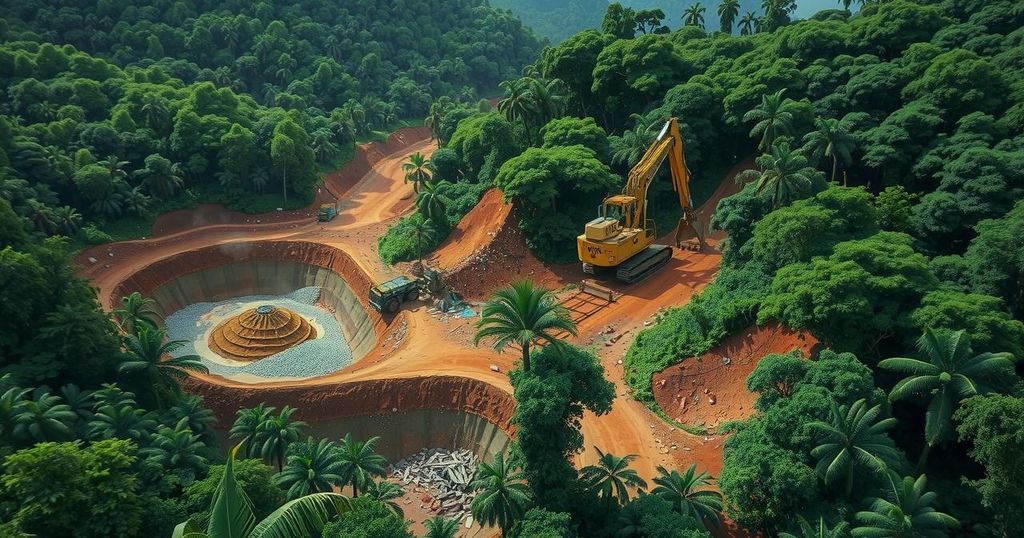China’s Illicit Mining Activities and Their Impacts in the DRC

China’s illegal mining operations in the DRC pose significant human rights and environmental concerns, as over 450 mining companies operate mostly unlawfully. Recent arrests of Chinese nationals raise issues of corruption, governance, and the local population’s suffering amid ongoing violence. Efforts for reform and projects like the Lobito Corridor promise ethical extraction, but skepticism and uncertainty remain high regarding their real impact on local communities.
The Democratic Republic of Congo (DRC) has faced a long history of exploitation by foreign powers, especially since the reign of King Leopold II. This exploitation continues today, primarily through illegal mining operations that have worsened conflicts fueled by both local and international armed groups, impacting the lives of many Congolese people. Despite the global tech industry’s reliance on DRC’s mineral resources, there is an alarming silence regarding the blatant lack of transparency surrounding these supply chains. The DRC stands as the deadliest global conflict zone since World War II, with over 10 million lives lost since 1996.
China plays a significant role in this picture, with reports indicating that over 450 mining companies in South Kivu are predominantly Chinese-owned and operating without adherence to Congolese mining laws. The alarming issue of illegal mining has grown severe in light of ongoing battles, particularly involving the M23 rebel group, which recently has been seizing territories in Eastern Congo. Instances of law enforcement arrests, like the detainment of 17 Chinese nationals in December 2024 for illegal gold mining, often end with little to no accountability—from the government’s end, raising concerns about corruption and governance in the region.
Recent revelations from the South Kivu Governor suggest a systematic pattern of money laundering that intertwines local and foreign actors. For example, on January 4, 2025, media uncovered that three Chinese nationals were linked to the illegal possession of ten gold bars and significant cash. Meanwhile, regional distress continues as citizens face a scarcity of essential services amidst this chaos, while contracts between the Chinese and Congolese governments read as mere entries for exploitation rather than genuine development.
The stark reality remains grim: mining operations not only fail to provide local communities with basic needs but further degrade their environments. Recent statistics highlight escalated rates of malnutrition and educational deficits among youth in mining areas, compounded by deteriorating water systems and significant rainforest degradation. With the ongoing violence escalating alongside precious mineral mining—elements needed for the tech industry, like coltan—critical attention is warranted.
While the South Kivu Governor, Professor Jean-Jacques Purusi, has begun efforts to expose illegal practices, skepticism looms over the prospects for reform without adequate support from Kinshasa. The community remains watchful of how genuine governance reforms might glean any differences given the pervasive corruption that engulfs the region. The DRC’s long-term stability remains contingent on true cooperation and accountability.
The Lobito Corridor project, a collaborative initiative supported by the U.S. and the E.U., raises hopes for more ethical extraction practices and promises enhanced job opportunities and investments. However, lingering questions loom over whether these cooperative efforts will truly lead to community upliftment, environmental restoration, and the cessation of forced child labor. There is considerable unease about whether transition into responsible mining practices is achievable without a foundational change in governance.
The world needs to pay attention to these human rights concerns that underline the relationship between technological demand and the devastation found in the DRC’s mineral-rich eastern region. As the global tech and economic sectors continue to thrive on these resources, an urgent call for transparency and ethical standards in mineral sourcing becomes imperative. Stakeholders, more than ever, must engage in these dialogues as the consequences of failure touch far-reaching lives within the DRC and beyond.
The ongoing exploitation of the DRC’s natural resources highlights a pressing need for greater transparency and accountability within the mining industry. With foreign entities, particularly Chinese companies, operating largely outside the law, the local population faces worsening conditions and rampant corruption. The potential for reforms in governance and the effectiveness of initiatives like the Lobito Corridor project must be critically evaluated. Ultimately, significant change must follow if the economic potential of the DRC’s minerals is to benefit its people and contribute to global ethical standards in resource management.
Original Source: www.hks.harvard.edu








